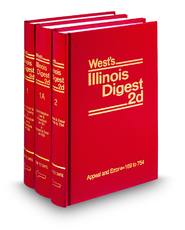Introduction to Case Digests

Most digests are published by West/Thomson Reuters and use the West Topic and Key Number System. This system allows the researcher to research similar cases in any jurisdiction that is covered by a West digest or has cases published in a West reporter. Because the topic and key number system from the print digests and reporters is also used in West's online system, knowing how to locate case law in print, and understanding how the information is organized, can lead to better online research results. Sometimes when online research is unsuccessful browsing through a print digest will help the researcher end up in the right place.
Digests (both print & online) allow you to:
- Locate case law on particular areas of law
- Browse the sub-topics included in a particular subject area by using the extensive Note and Topic Analysis (outline)
- Locate cases when all you have is a case name, by using the Table of Cases
- Locate cases that have defined a particular word or phrase, by using the Words and Phrases volumes
Using a Print Digest
- Select an appropriate digest. (See "What Digests are Available at NIU?" on this page.)
- Use the Descriptive Word Index volumes to translate your ideas or issues into the topics and key numbers used in the digest. (See "What are Topics and Key Numbers?" on this page.)
- The main volumes of the digest are arranged alphabetically by topic. Locate the Topic(s) you found in the Descriptive Word Index. Within that Topic, locate the key number (the number that was in bold in the Descriptive Word Index).
- At the beginning of each Topic there will be a Scope Note and Topic Analysis, which are short and long outlines placed before all the case annotations begin. It is helpful to scan through these outlines to locate related information which you may not have been referred to by the Descriptive Word Index.
- Always check the pocket part or free-standing supplement to the main volume to discover if any new information has been added.
- Locate, and then read, the full text of the cited cases. You must always read the full text of an opinion before citing it in any document. Never rely just on the annotations in the digest as your only source of information. The citation to the case is found at the end of each annotation. You can then find the case online.
- When reading the cases, pay particular attention to the topic and key numbers found in the headnotes. Take note of any topic and key numbers you have not already seen that seem promising for your research.
- Return to the digest with these topics and key numbers to locate additional case law on your subject.
What Digests are Available at NIU?
Note that this is not a complete list of digests. Most states have individual digests and several of the regional reporters have corresponding digests. There are also subject-specific digests (e.g., bankruptcy, education law). All of these can be found online in Westlaw.
- West's Illinois Digest 2d (Illinois Collection, KFI 1257 .I52) covers all reported Illinois Appellate (intermediate appellate and Illinois Supreme Court) cases as well as any reported Federal and U.S. Supreme Court decisions that arose in Illinois. This is the only print digest that is currently updated in the Law Library. It is also available online.
- West's Federal Practice Digest 3d (located outside of the library in the North Wing, KF 127 .W43) covers all reported decisions of federal cases at all levels (District, Circuit and U.S. Supreme Court). It is no longer updated in print, but is available online.
- West's American Digest System (11th Decennial Digest, South Wing, KF 141 1996) covers cases from all fifty states and all federal courts, including the U.S. Supreme Court. This is a very useful source when you need to locate cases from multiple jurisdictions that deal with the same issue. While the set is no longer updated in print, it can still be used as a starting point for cross-jurisdiction research. It is also available online.